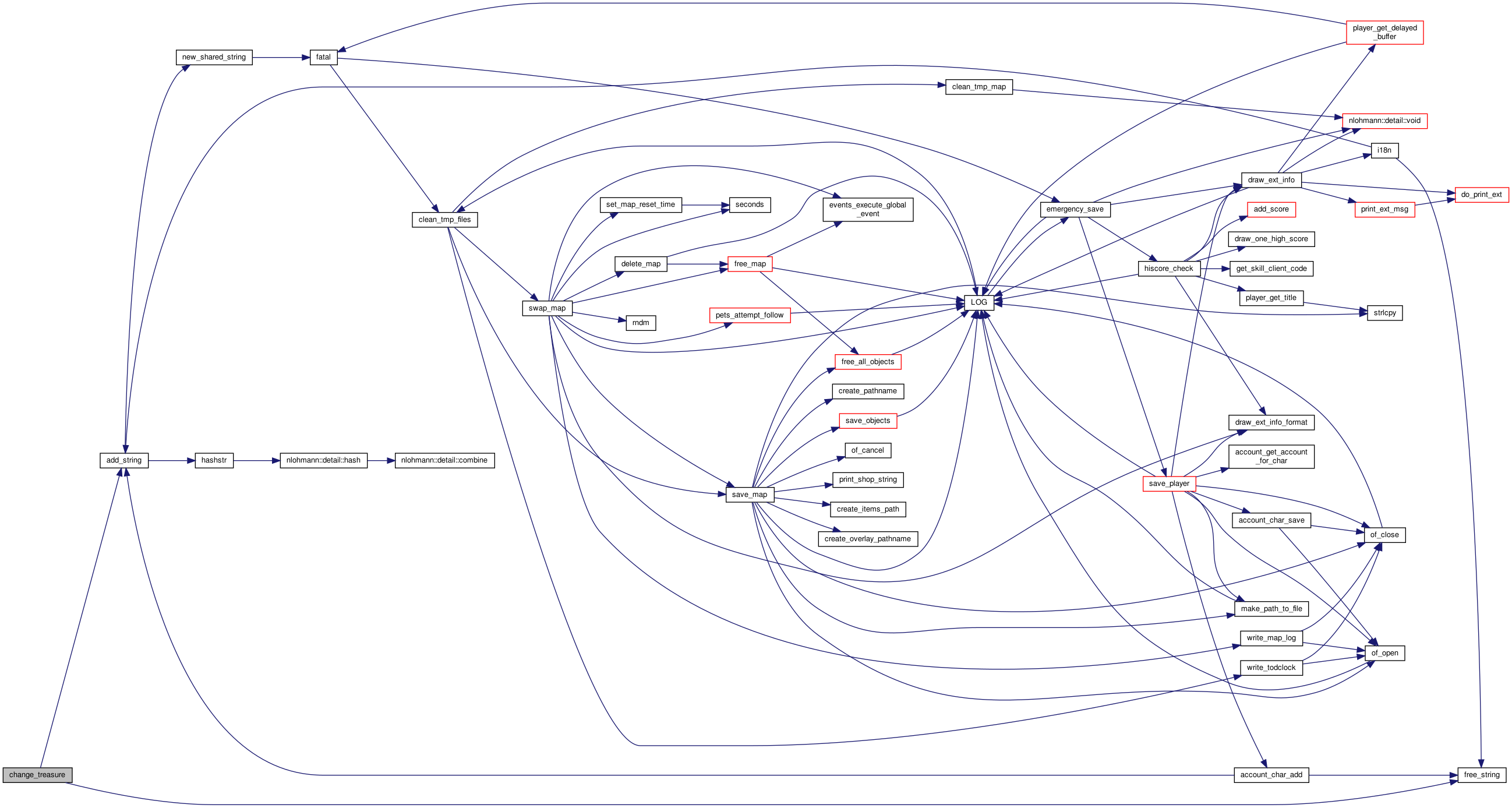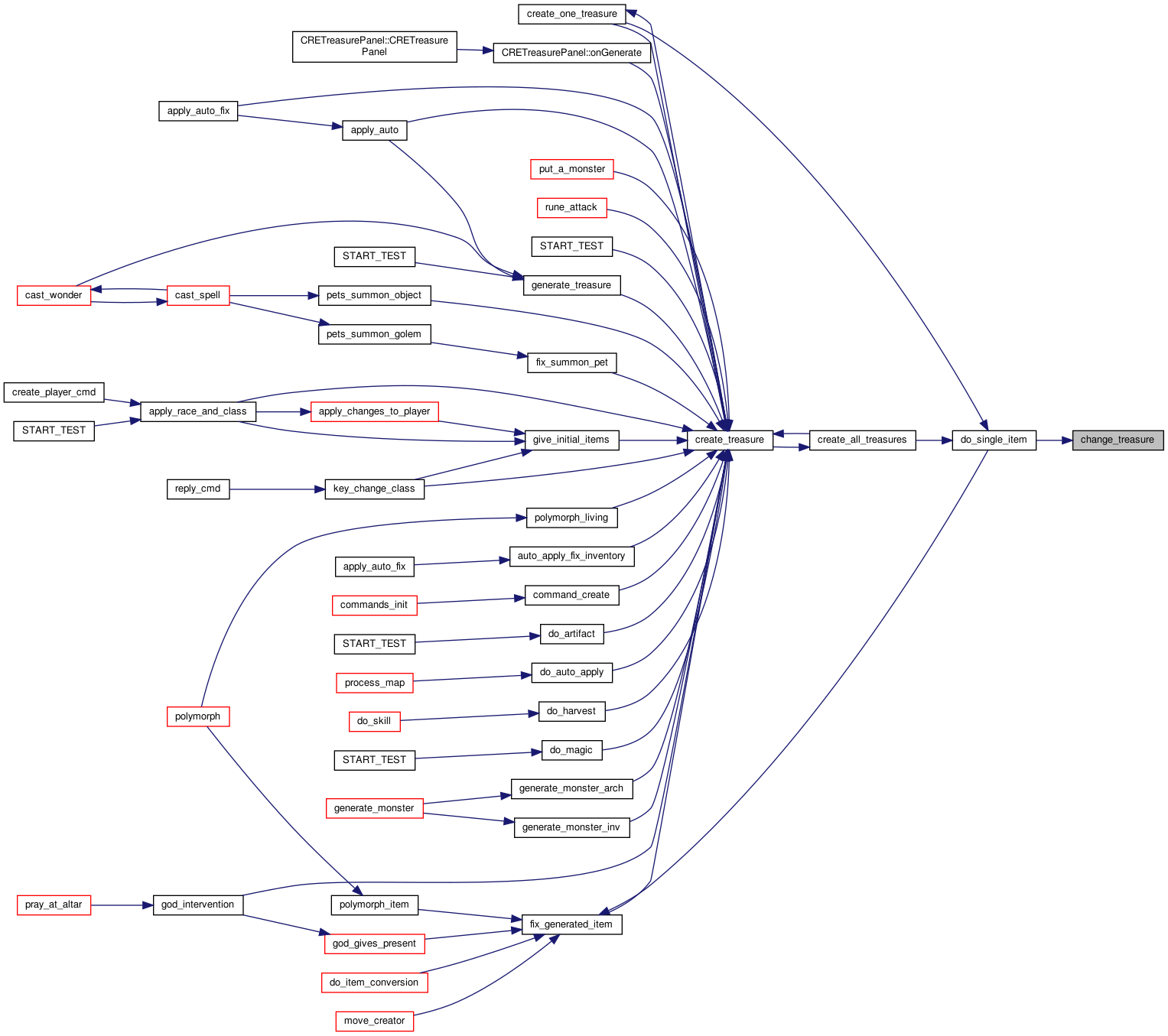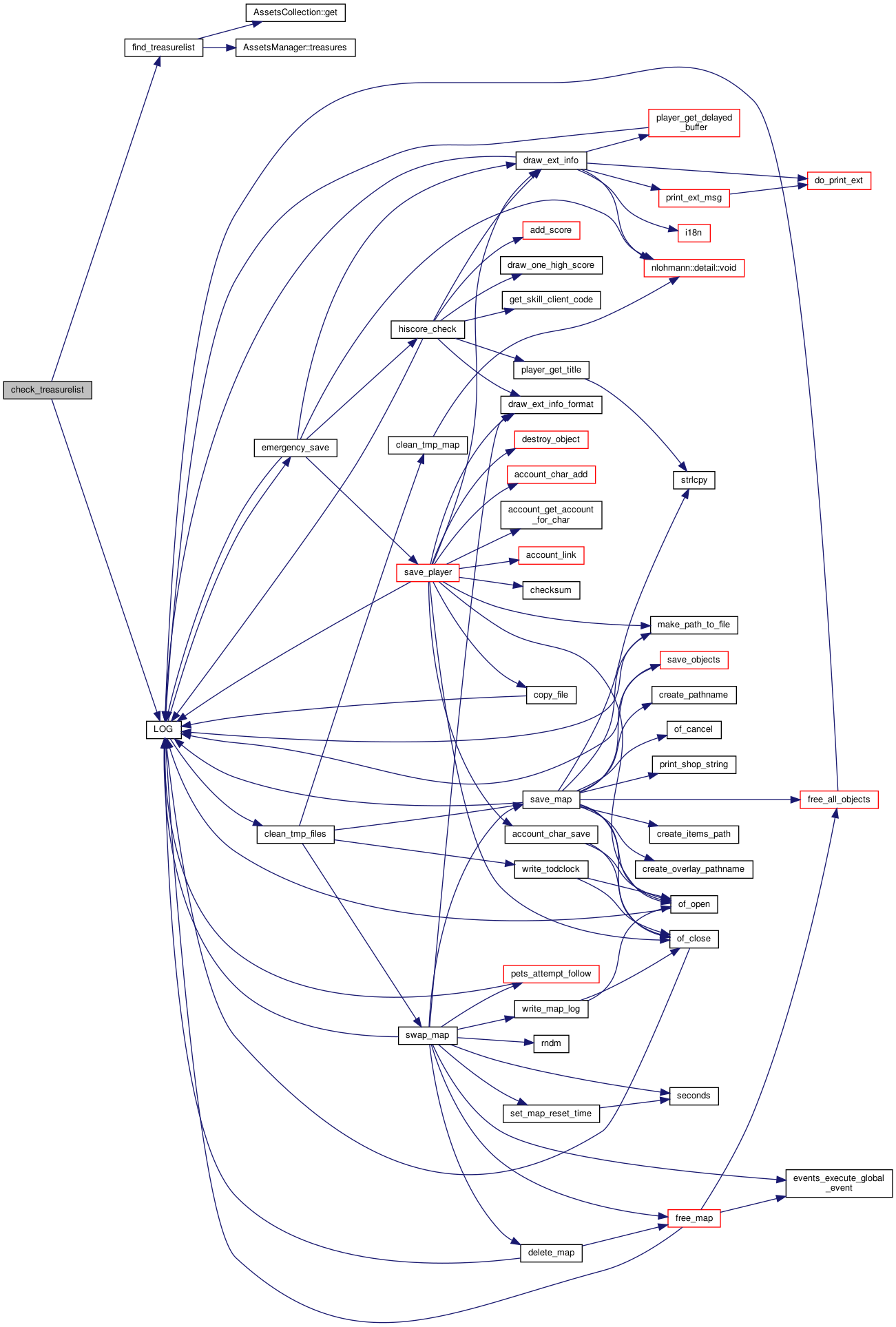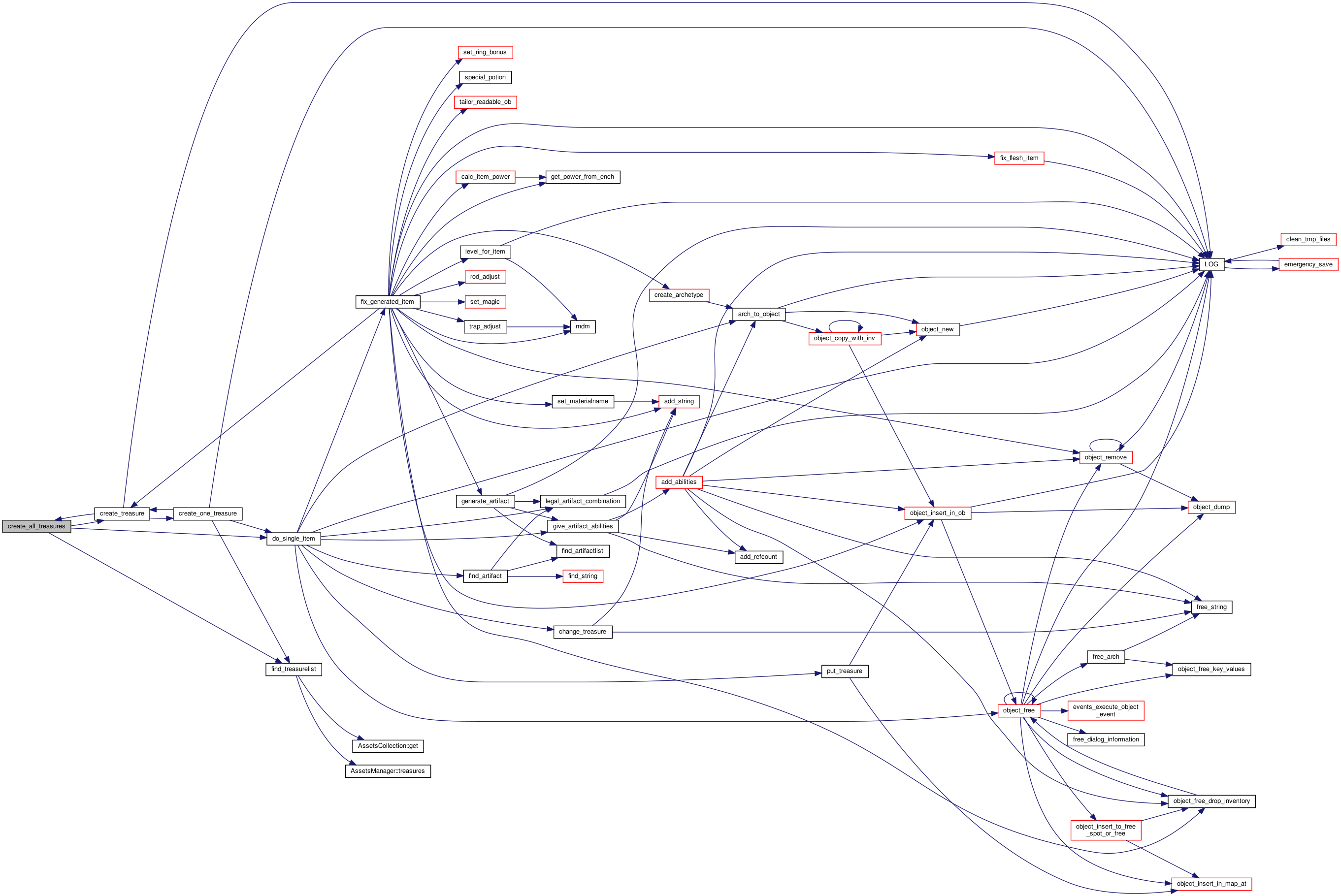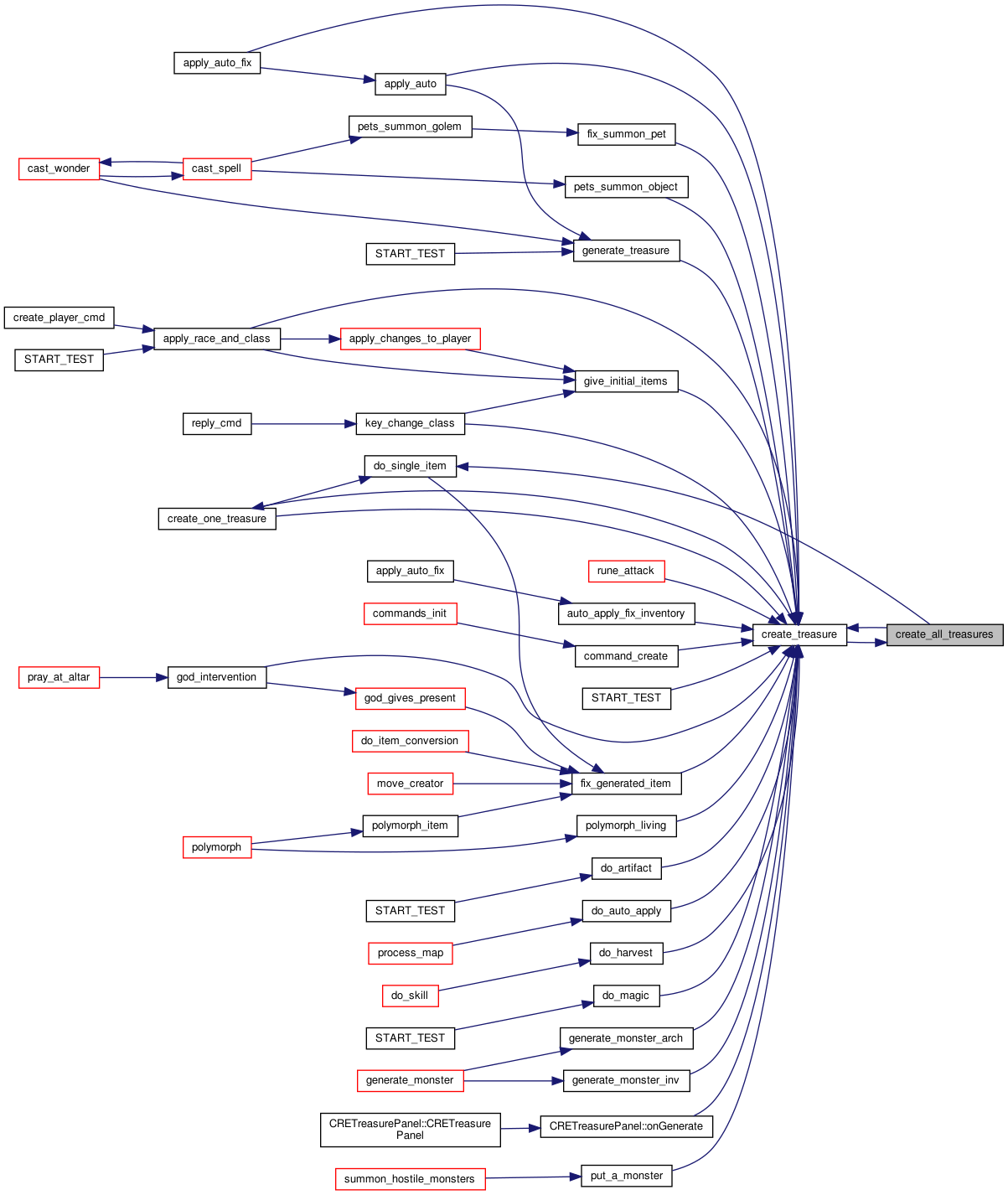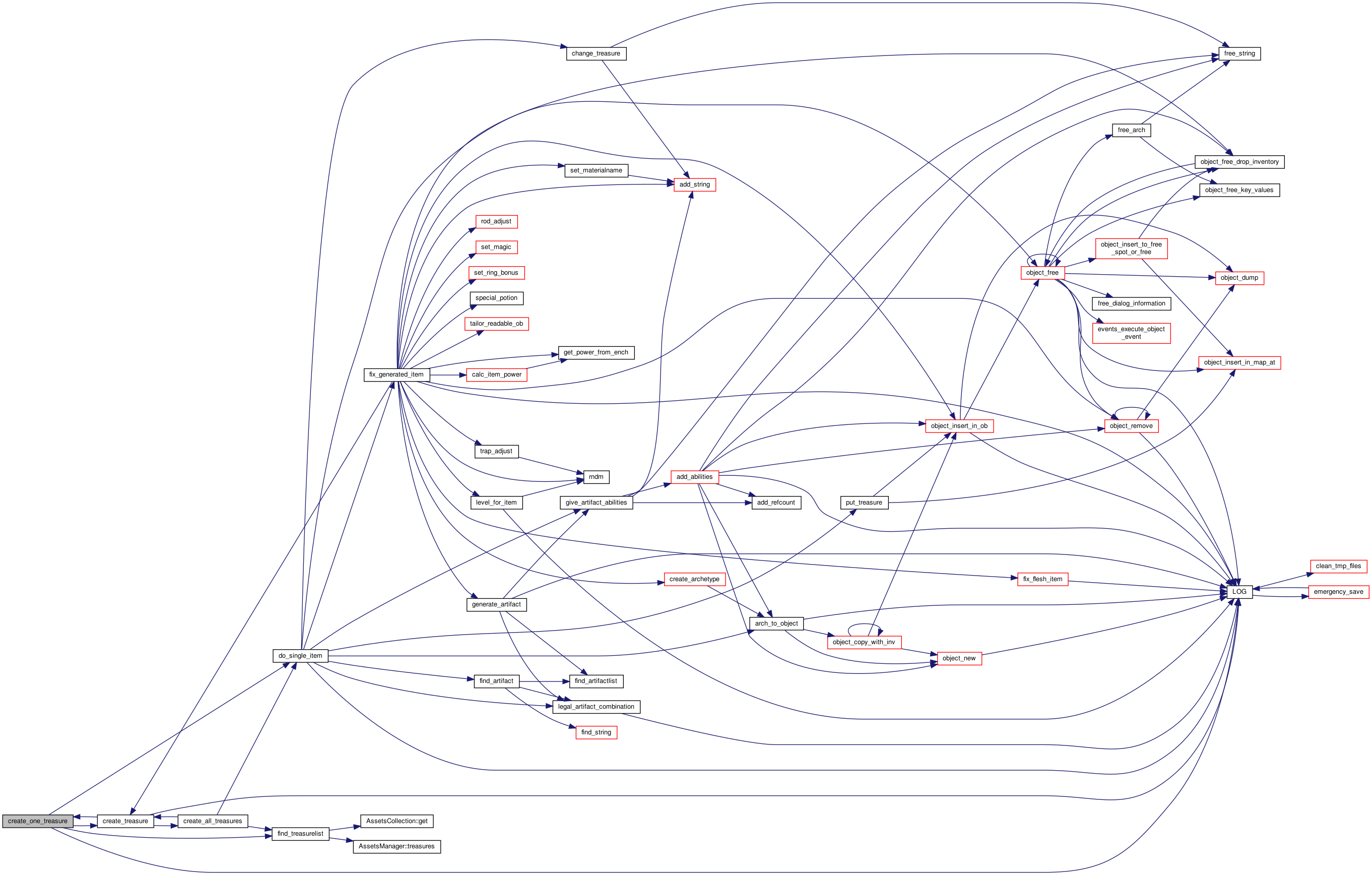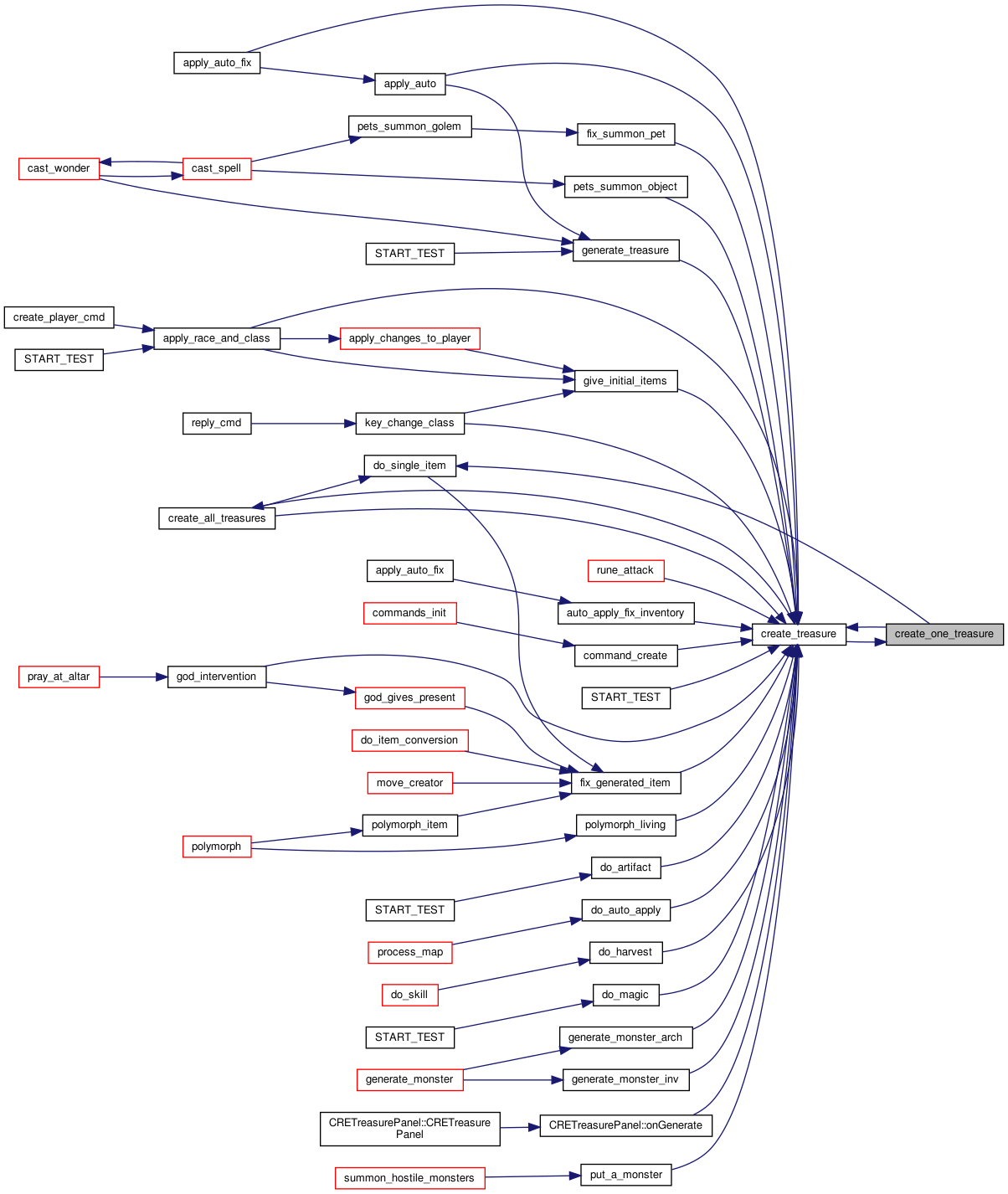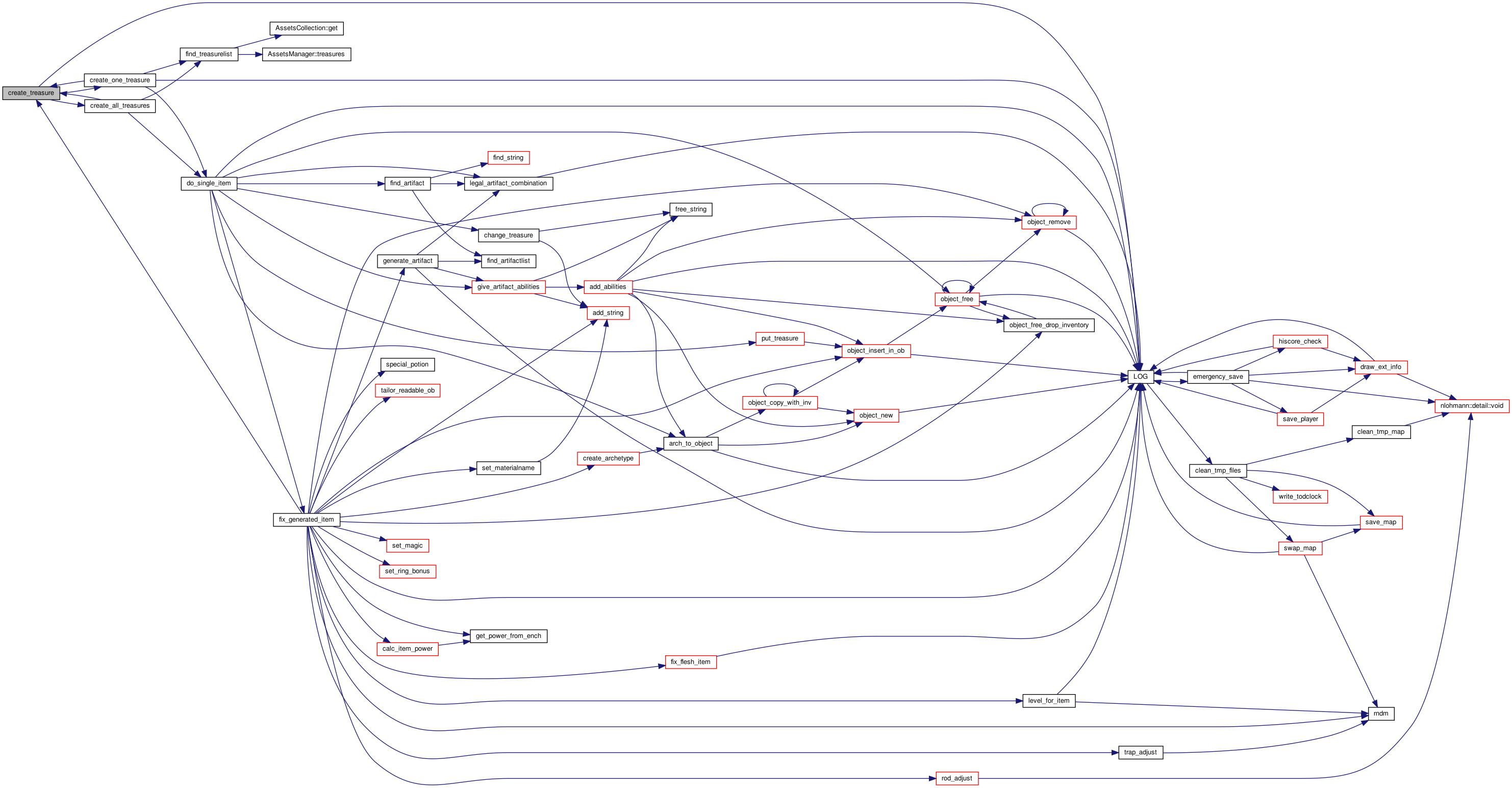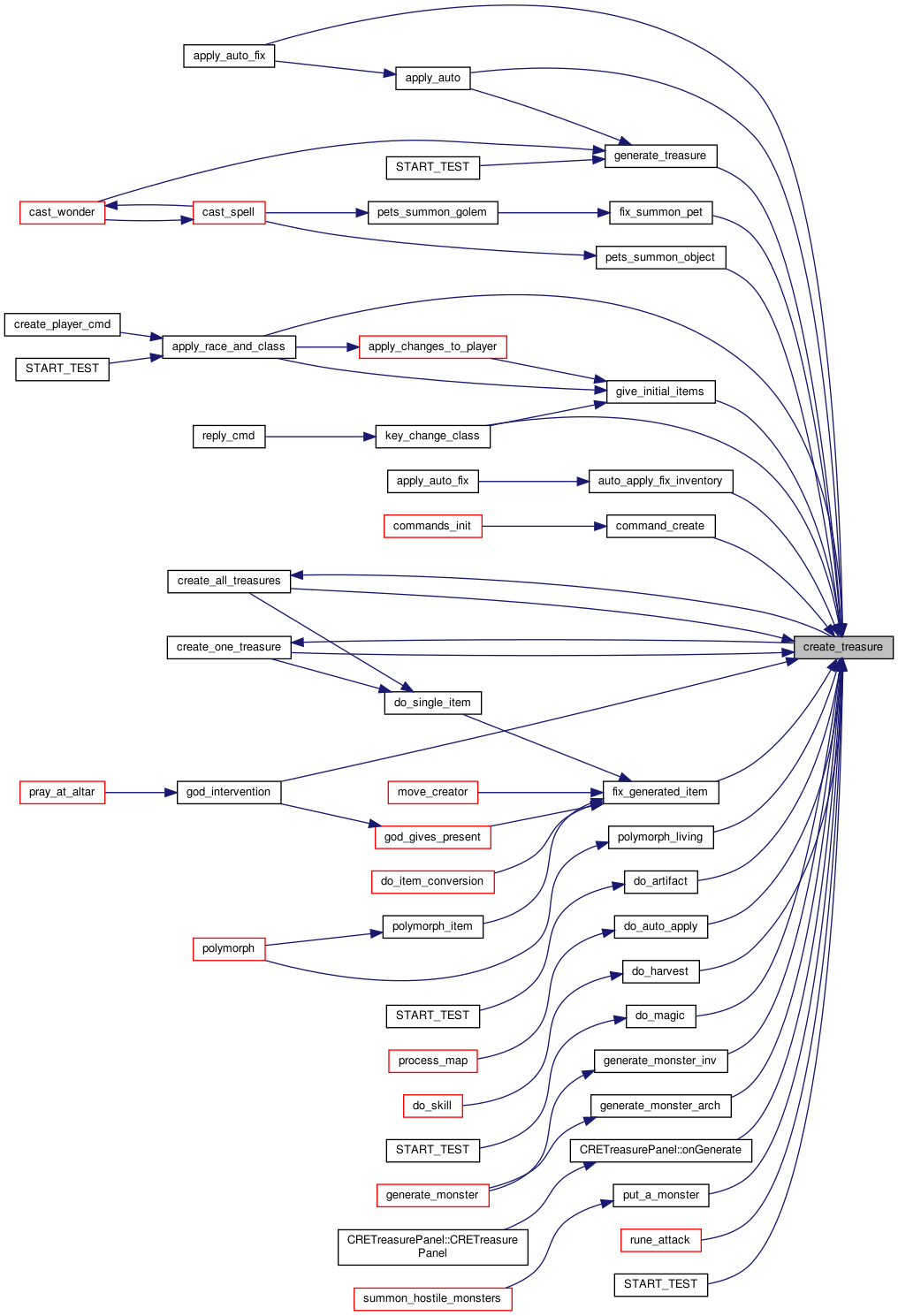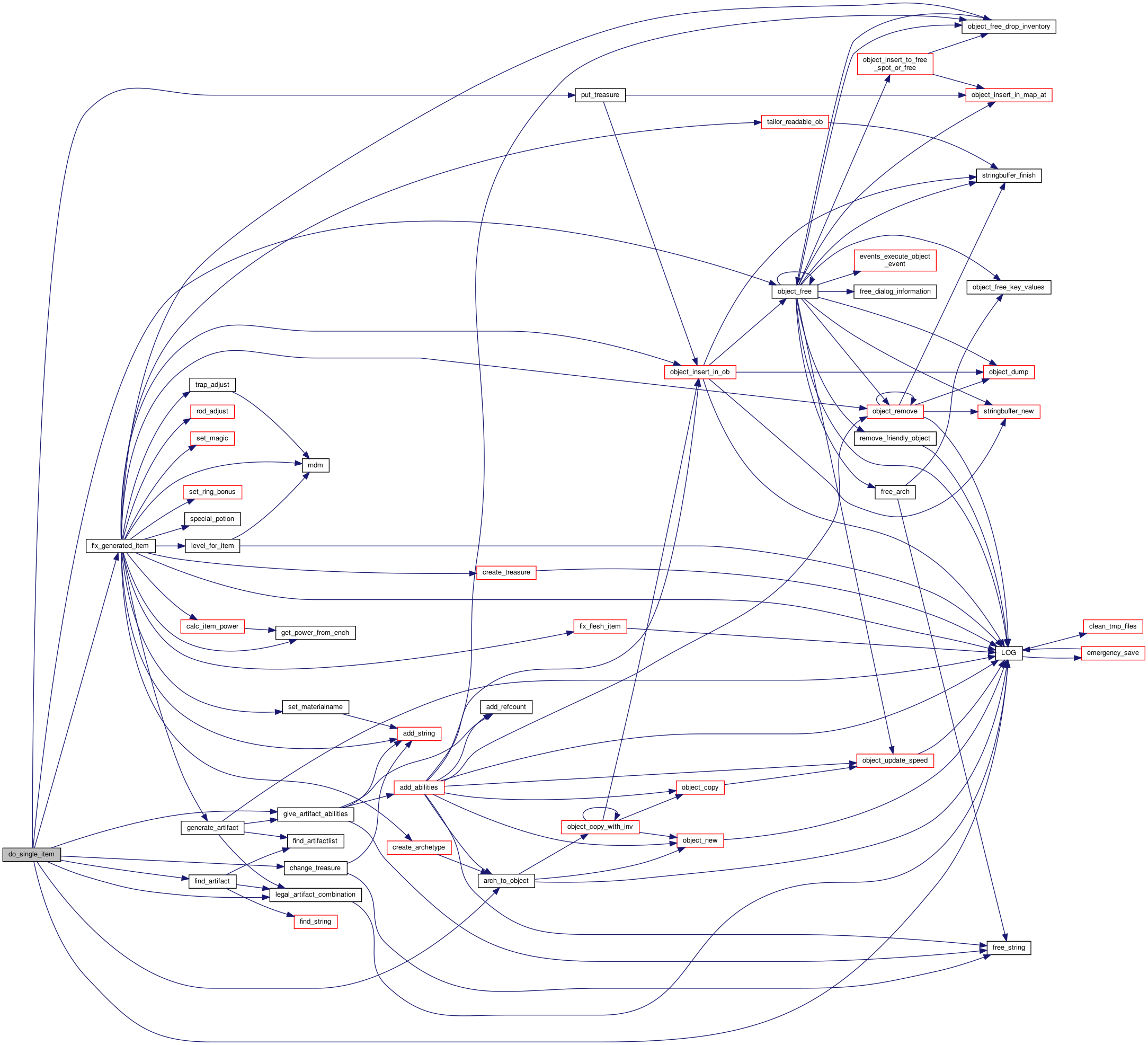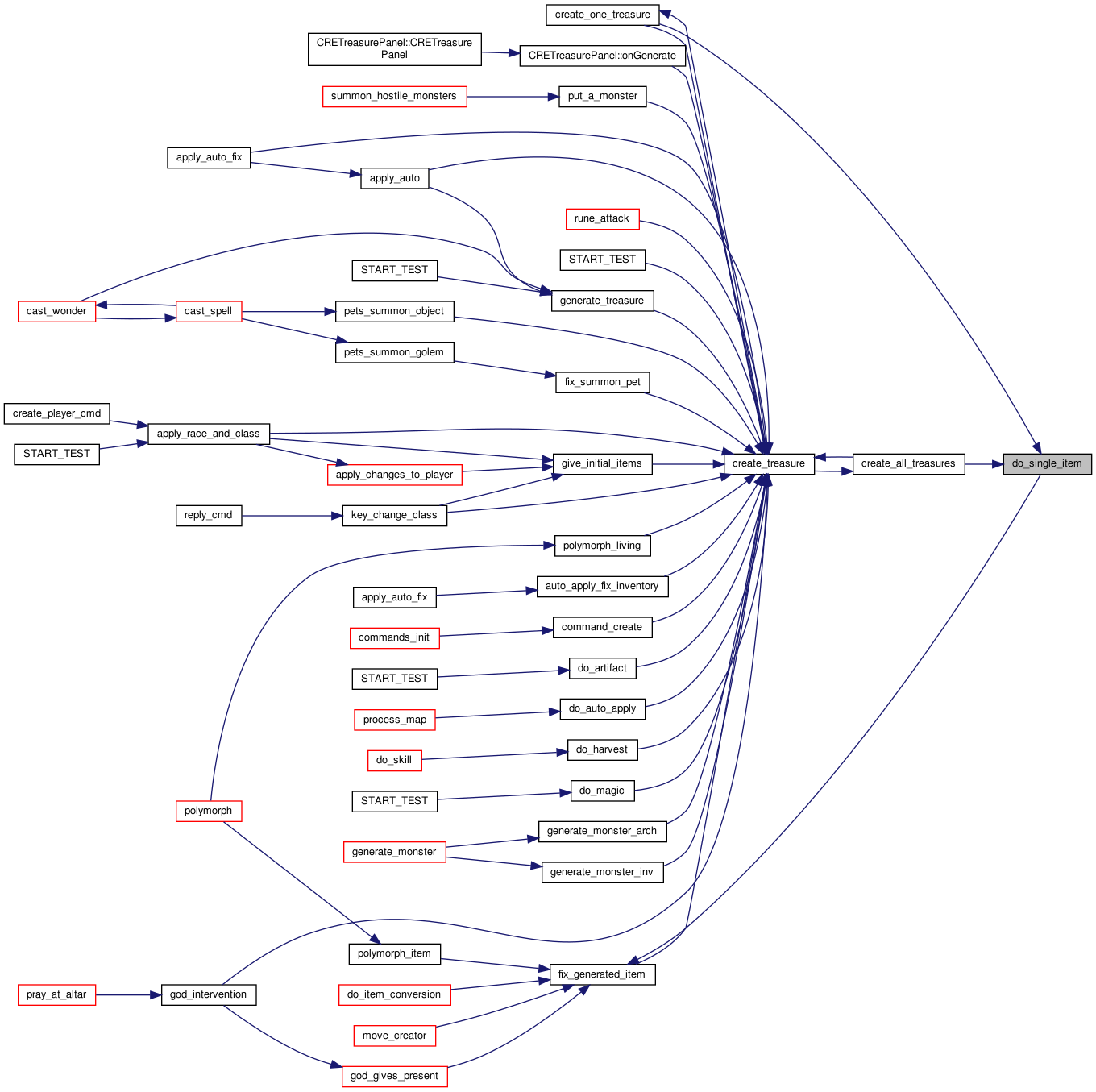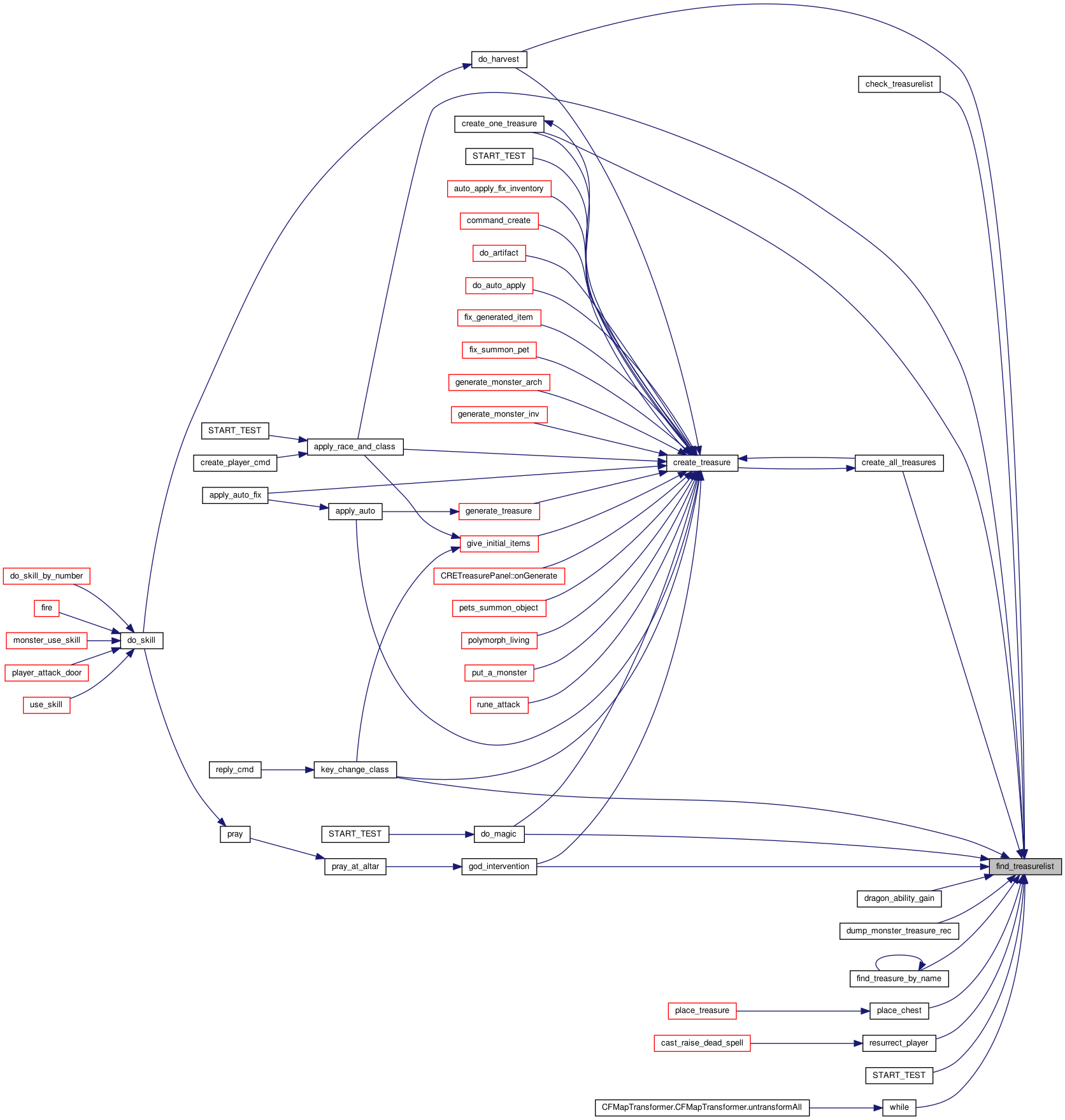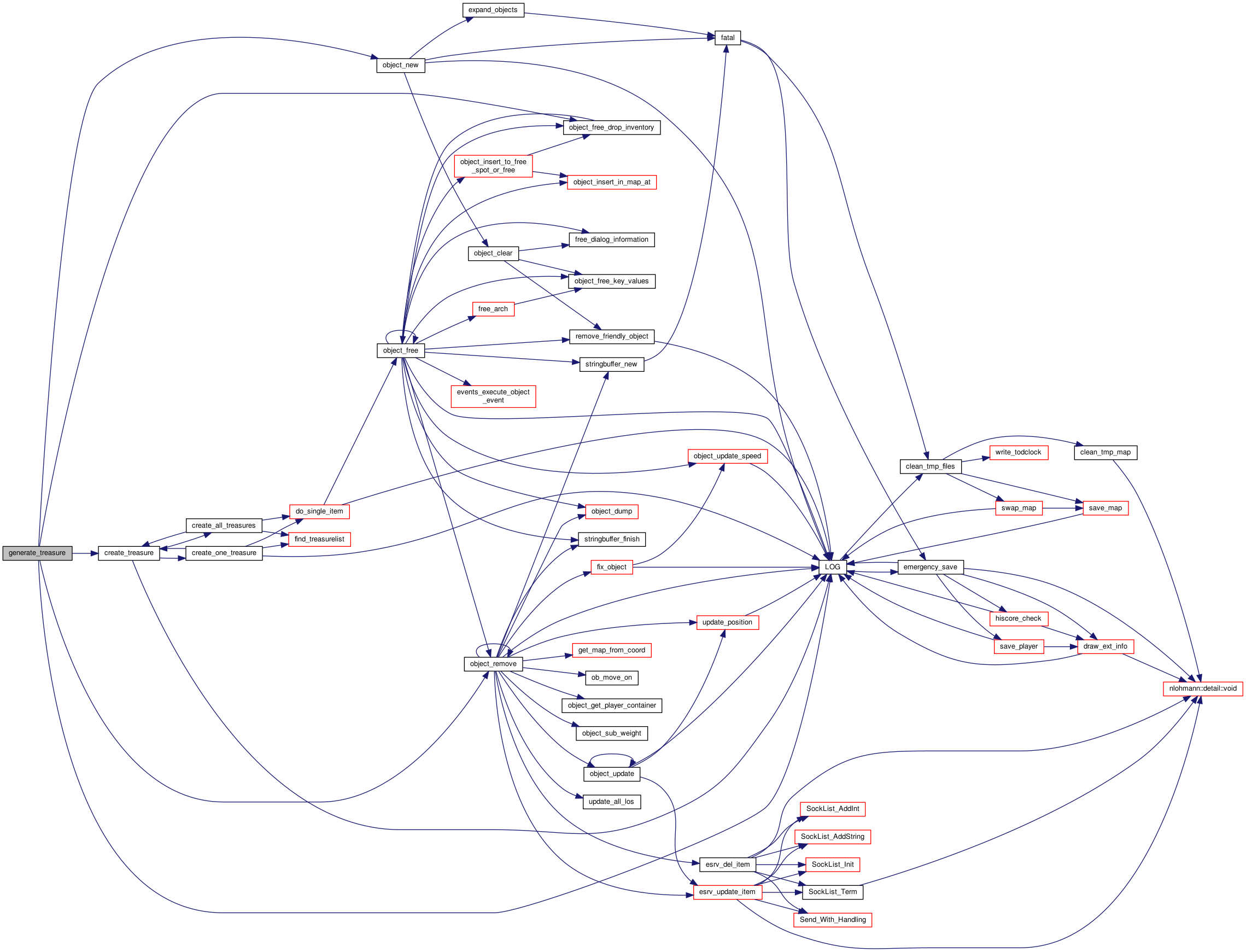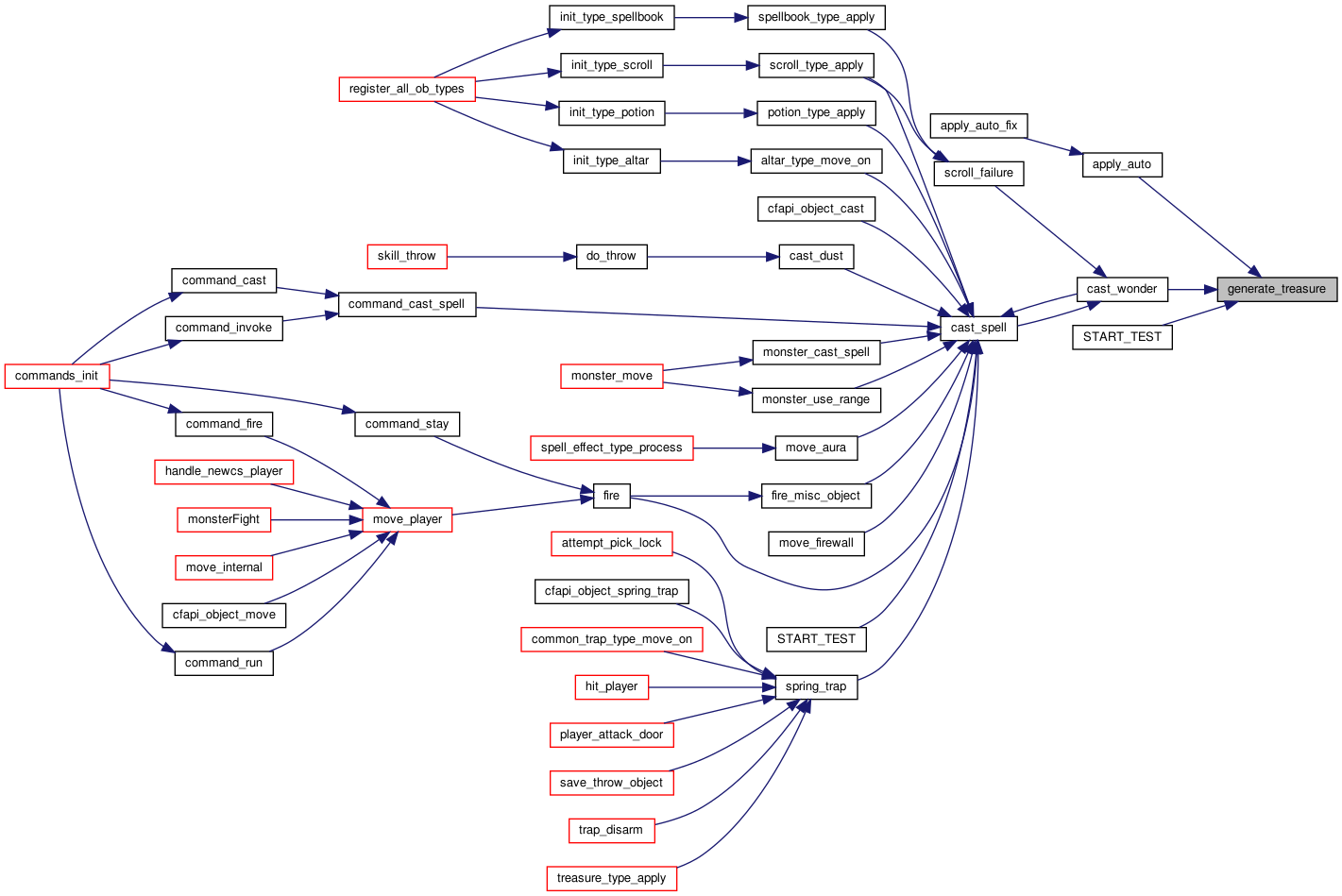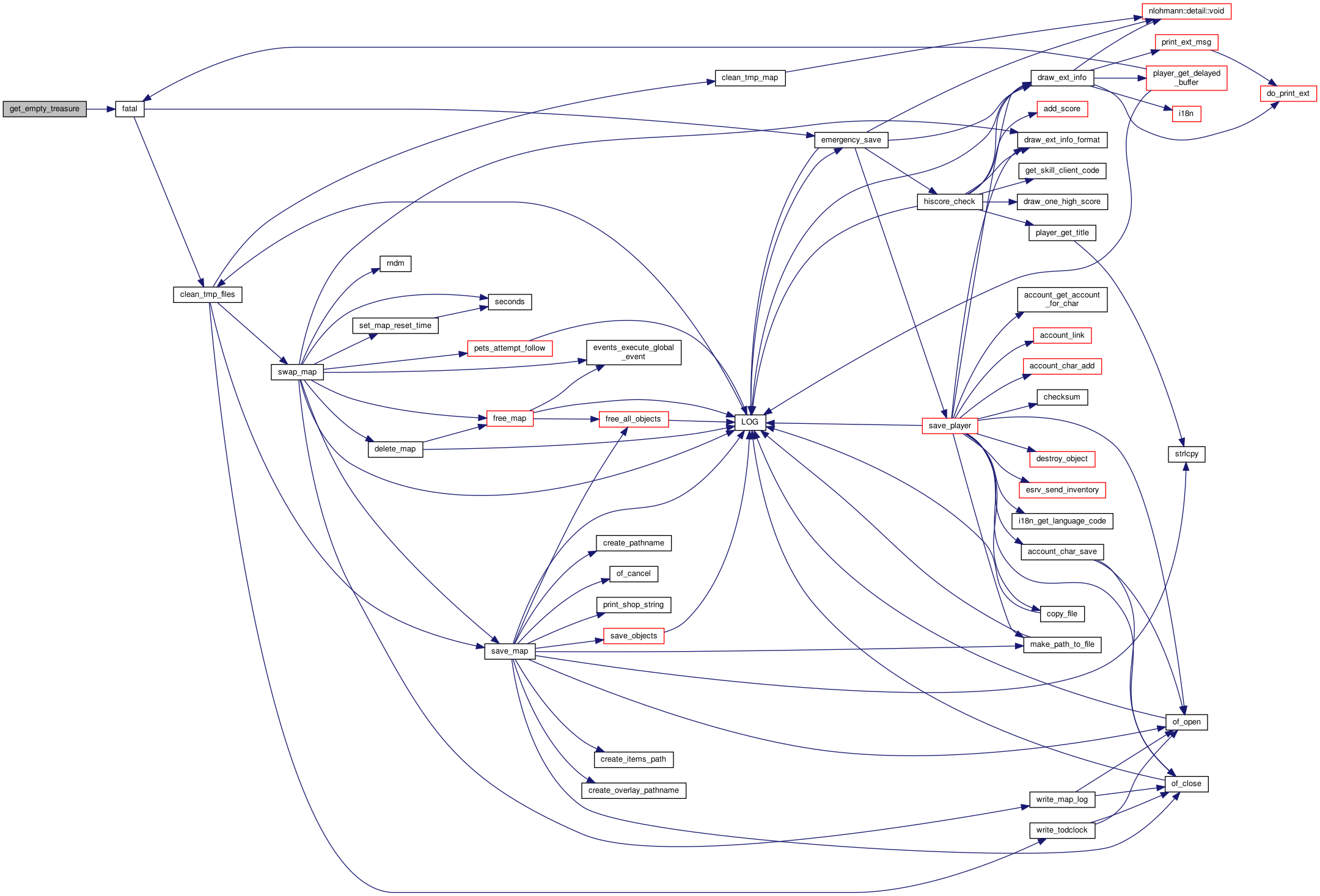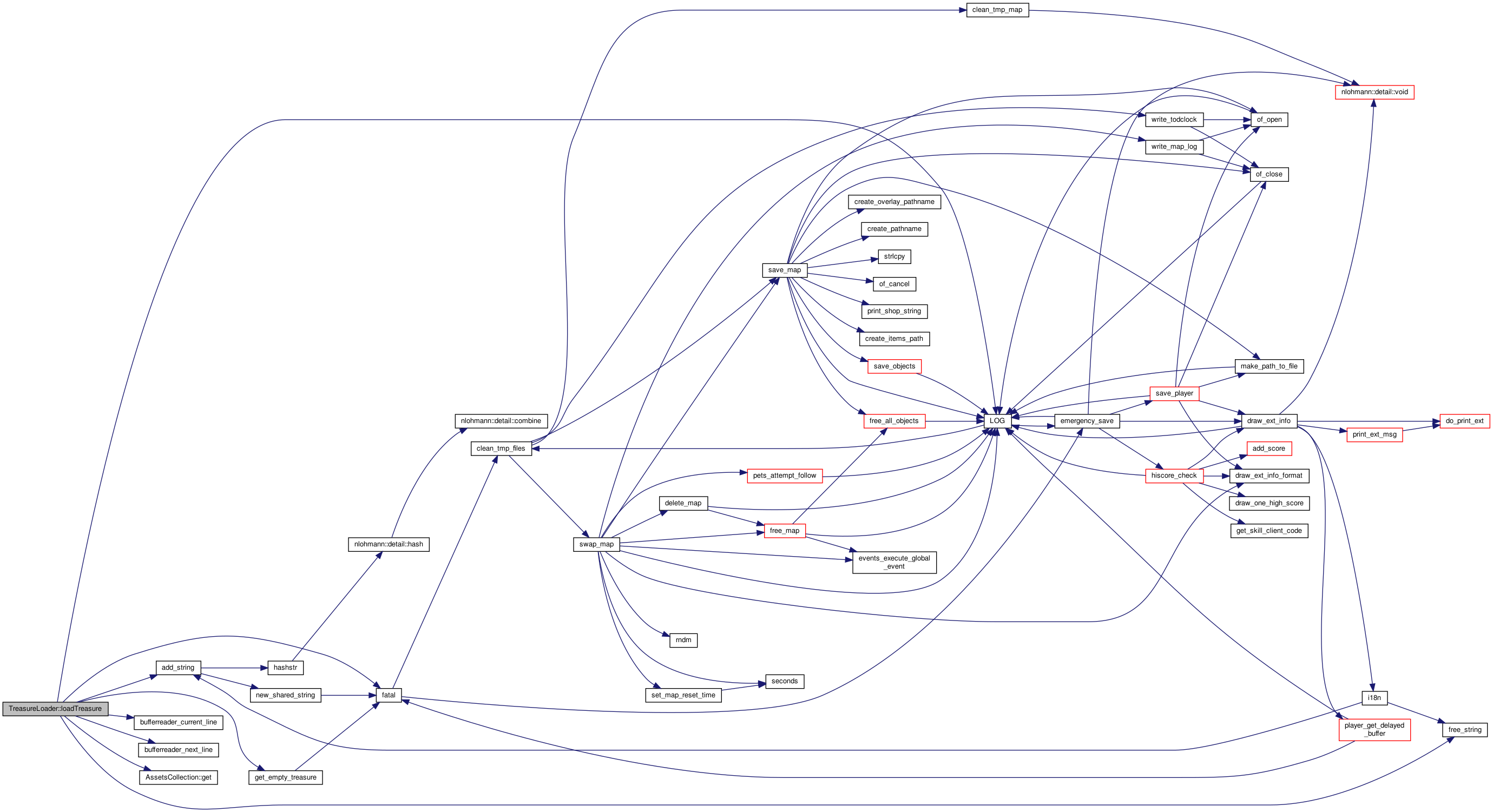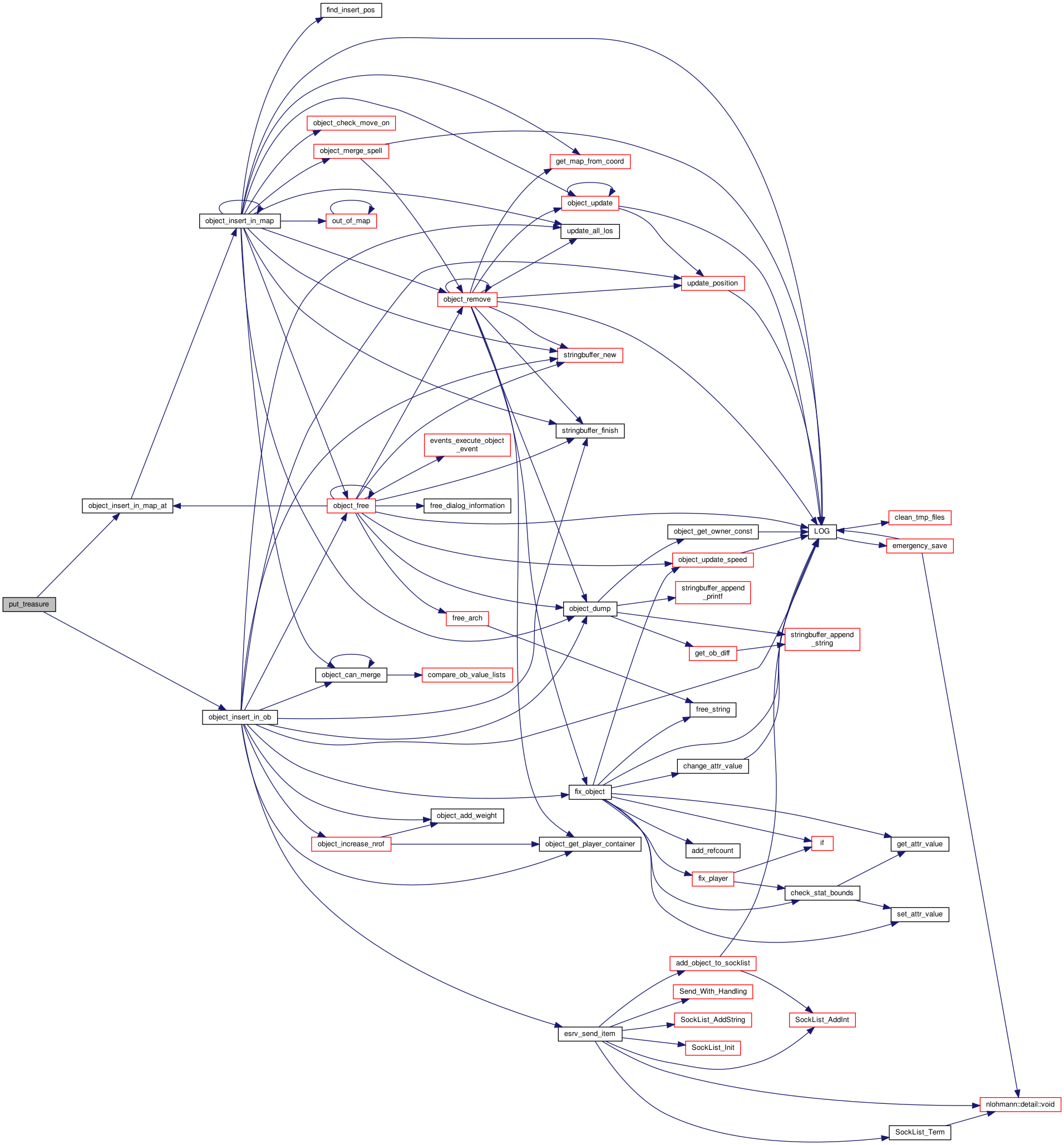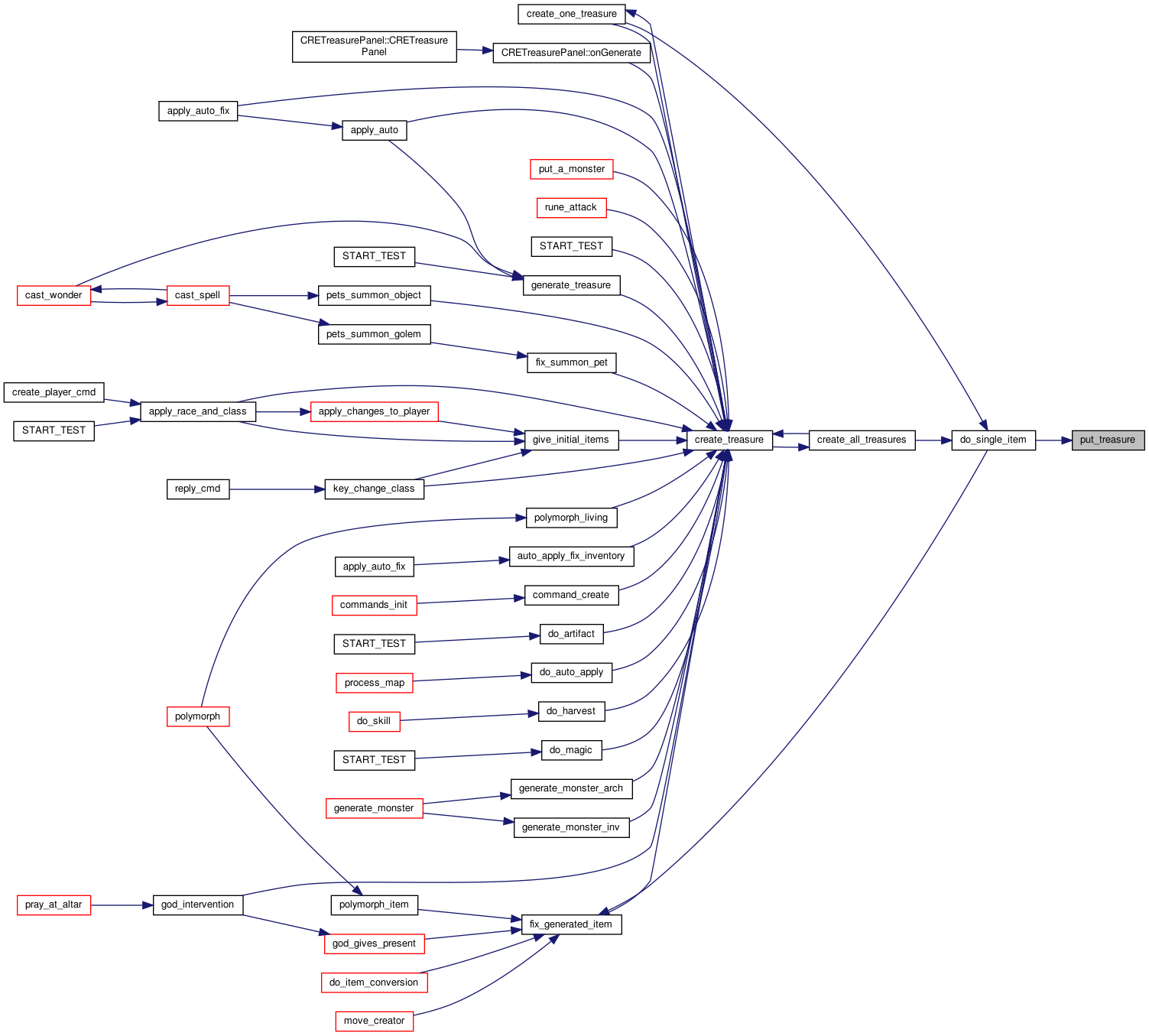Functions | |
| static void | change_treasure (treasure *t, object *op) |
| static void | check_treasurelist (treasure *t, const treasurelist *tl) |
| static void | create_all_treasures (treasure *t, object *op, int flag, int difficulty, int tries) |
| static void | create_one_treasure (treasurelist *tl, object *op, int flag, int difficulty, int tries) |
| void | create_treasure (treasurelist *t, object *op, int flag, int difficulty, int tries) |
| static void | do_single_item (treasure *t, object *op, int flag, int difficulty) |
| treasurelist * | find_treasurelist (const char *name) |
| object * | generate_treasure (treasurelist *t, int difficulty) |
| treasure * | get_empty_treasure (void) |
| treasure * | TreasureLoader::loadTreasure (BufferReader *reader, const std::string &filename) |
| static void | put_treasure (object *op, object *creator, int flags) |
Detailed Description
Introduction
Treasure lists specify what items an object can have when it is first created during a map initialisation.
Treasure lists contain items with a certain probability of apparition. When the list is instancied, so that for instance a monster can receive its items, the items are randomly chosen based on this probability, and inserted at the desired location.
Lists can reference other lists to group commony-used definitions.
The list format enables a yes-no structure, so that the presence of an item implies the presence of another (so arrows are given with a bow) or the absence of an item enables another item to be present (so a bow or a crossbow can be given, but not both).
Each item in the list has a chance factor, that determines its probability to be generated.
Treasure lists exist in two variations:
- a treasure list will try to insert all its items in the object. Each item has a probability chance % to be generated.
- a treasureone list will only select a random item to be inserted. An item has a probability of chance on (sum of all chance for the items in the list) to be generated
Treasure files
Treasures are defined in .trs files in the archetypes tree. For historical reasons, many are groupes in treasures.trs at the root or archetypes.
Treasure generation
When a treasure must be generated, a magic level is used to determine what items are eligible for generation. An item on a treasure list can only be generated if its magic field is less then the magic level specified.
Some flags can alter the generating behaviour. In particular, GT_ONLY_GOOD will forbid the generation of cursed or damned items.
A maximum of 100 tries will be done to generate an item, after which the generation is considered to have failed.
Treasure file format
The format is a line by line description of the treasure, and its options. The text before the first space is the field, remaining of the line is the value.
A treasure list definition starts by a treasure, treasureone, yes, no or more parameter. If treasure or treasureone is used, the part on the right of the first space is the treasure list name. The definition must end by a end line.
The line can start by spaces that will be ignored. A line starting by # is a comment and will be totally ignored.
The following fields are available:
- treasure: starts a new treasure list, from which all items may be generated
- treasureone: starts a new treasure list, from which only one item may be generated
- arch: archetype name of the item to generate
- artifact: name of the artifact to make
archof; in this casemagicis ignored. If theitemis incompatible withartifact, then no item is generated - list: treasure list name to reference
- list_magic_value: if non-zero,
listwill be generated with this difficulty instead of the current one - list_magic_adjustment: if list_magic_value is 0, this value is added (it can be negative) to the current difficulty to generate
list - change_name: what name to give to the generated item
- change_title: what title to give to the generated item
- change_slaying: what slaying to give to the generated item
- chance: probability of the item appearing, in % for a treasure list or relative to the sum of all chance for treasureone. Defaults to 100
- nrof: maximum number of items to generate. Omitted means archetype default
- magic: for a
list, minimum magic required for this list to be generated; for anitem, the maximum magic it can have (capping the magic from the difficulty), this may restrict artifacts which may be generated; does not apply ifartifactis set - yes: starts a new treasure that will be generated if the current item is generated
- no: starts a new treasure that will be generated if the current item is not generated
- end: ends the current treasure definition
- more: starts a new treasure that will be in the same list as the current one
Either arch or list must be set.
Simple example
treasure rod arch rod_light chance 2 no arch rod_heavy chance 1 end end
This treasure means:
- there's a probability of 2% to give a rod_light
- if no rod_light is given, then there is a probability of 1% to give a rod_heavy
Complex example
treasure poor_old
arch bow
chance 5
yes
arch arrow
nrof 6
end
more
arch b_ssword_2
magic 1
chance 5
no
arch b_ssword_1
chance 10
no
arch b_dagger
chance 15
no
arch stoneaxe
chance 20
no
arch club
chance 25
end
end
end
end
more
arch b_small_shield
chance 4
more
arch silvercoin
nrof 8
chance 10
endGiven the magic of 1 or more, this list has:
- a 5% chance of generating a bow and up to 6 arrows
- a 5% chance of generating a b_ssword_2
- a 95% * 10% chance of generating a b_ssword_1
- a 95% * 90% * 15% chance of generating a b_dagger
- (and so on)
- a 4% chance of generating a b_small_shield
- a 10% chance of generating silver coins, from 1 to 8
Function Documentation
◆ change_treasure()
if there are change_xxx commands in the treasure, we include the changes in the generated object
- Parameters
-
t treasure. op actual generated treasure.
Definition at line 105 of file treasure.cpp.
References add_string(), FREE_AND_COPY, free_string(), give::op, and Floor::t.
Referenced by do_single_item().
 Here is the call graph for this function:
Here is the call graph for this function: Here is the caller graph for this function:
Here is the caller graph for this function:◆ check_treasurelist()
|
static |
Checks if a treasure if valid. Will also check its yes and no options.
Will LOG() to error.
- Parameters
-
t treasure to check. tl needed only so that the treasure name can be printed out.
Definition at line 93 of file assets.cpp.
References find_treasurelist(), llevError, LOG(), treasurelist::name, and Floor::t.
 Here is the call graph for this function:
Here is the call graph for this function:◆ create_all_treasures()
|
static |
Creates all the treasures.
- Parameters
-
t what to generate. op for who to generate the treasure. flag combination of GT_xxx values. difficulty map difficulty. tries to avoid infinite recursion.
Definition at line 175 of file treasure.cpp.
References create_treasure(), do_single_item(), find_treasurelist(), give::op, RANDOM, and Floor::t.
Referenced by create_treasure().
 Here is the call graph for this function:
Here is the call graph for this function: Here is the caller graph for this function:
Here is the caller graph for this function:◆ create_one_treasure()
|
static |
Creates one treasure from the list.
- Parameters
-
tl what to generate. op for who to generate the treasure. flag combination of GT_xxx values. difficulty map difficulty. tries to avoid infinite recursion.
- Note
- can abort() if treasure has errors.
Definition at line 210 of file treasure.cpp.
References create_treasure(), do_single_item(), find_treasurelist(), FLAG_CURSED, FLAG_DAMNED, GT_ONLY_GOOD, treasurelist::items, llevDebug, llevError, LOG(), give::op, QUERY_FLAG, RANDOM, Floor::t, treasurelist::total_chance, and autojail::value.
Referenced by create_treasure().
 Here is the call graph for this function:
Here is the call graph for this function: Here is the caller graph for this function:
Here is the caller graph for this function:◆ create_treasure()
| void create_treasure | ( | treasurelist * | t, |
| object * | op, | ||
| int | flag, | ||
| int | difficulty, | ||
| int | tries | ||
| ) |
This calls the appropriate treasure creation function.
- Parameters
-
t what to generate. op for who to generate the treasure. flag combination of GT_xxx values. difficulty map difficulty. tries to avoid infinite recursion.
Definition at line 263 of file treasure.cpp.
References create_all_treasures(), create_one_treasure(), llevDebug, llevError, LOG(), give::op, and Floor::t.
Referenced by apply_auto(), apply_auto_fix(), apply_race_and_class(), auto_apply_fix_inventory(), command_create(), create_all_treasures(), create_one_treasure(), do_artifact(), do_auto_apply(), do_harvest(), do_magic(), fix_generated_item(), fix_summon_pet(), generate_monster_arch(), generate_monster_inv(), generate_treasure(), give_initial_items(), god_intervention(), key_change_class(), CRETreasurePanel::onGenerate(), pets_summon_object(), polymorph_living(), put_a_monster(), rune_attack(), and START_TEST().
 Here is the call graph for this function:
Here is the call graph for this function: Here is the caller graph for this function:
Here is the caller graph for this function:◆ do_single_item()
Creates the item for a treasure.
- Parameters
-
t what to generate. op for who to generate the treasure. flag combination of GT_xxx values. difficulty map difficulty.
Definition at line 139 of file treasure.cpp.
References arch_to_object(), change_treasure(), find_artifact(), fix_generated_item(), FREE_OBJ_FREE_INVENTORY, FREE_OBJ_NO_DESTROY_CALLBACK, give_artifact_abilities(), GT_INVISIBLE, make_face_from_files::int, artifact::item, legal_artifact_combination(), llevError, LOG(), object_free(), give::op, put_treasure(), RANDOM, Floor::t, and Ice::tmp.
Referenced by create_all_treasures(), and create_one_treasure().
 Here is the call graph for this function:
Here is the call graph for this function: Here is the caller graph for this function:
Here is the caller graph for this function:◆ find_treasurelist()
| treasurelist* find_treasurelist | ( | const char * | name | ) |
Search for the given treasurelist by name.
- Parameters
-
name treasure list to search.
- Returns
- match, or NULL if treasurelist doesn't exist or is 'none'.
Definition at line 249 of file assets.cpp.
References AssetsCollection< T, Key >::get(), manager, give::name, and AssetsManager::treasures().
Referenced by apply_race_and_class(), check_treasurelist(), create_all_treasures(), create_one_treasure(), do_harvest(), do_magic(), dragon_ability_gain(), dump_monster_treasure_rec(), find_treasure_by_name(), god_intervention(), key_change_class(), place_chest(), resurrect_player(), START_TEST(), and while().
 Here is the call graph for this function:
Here is the call graph for this function: Here is the caller graph for this function:
Here is the caller graph for this function:◆ generate_treasure()
| object* generate_treasure | ( | treasurelist * | t, |
| int | difficulty | ||
| ) |
Generate a treasure from a list generating a single item. This is similar to the old generate treasure function. However, it instead takes a treasurelist. It is really just a wrapper around create_treasure(). We create a dummy object that the treasure gets inserted into, and then return that treasure.
- Warning
- an error will be LOG()ed if more than one item is generated.
- Parameters
-
t treasure list to generate from. difficulty treasure difficulty.
- Returns
- generated treasure. Can be NULL if no suitable treasure was found.
Definition at line 295 of file treasure.cpp.
References create_treasure(), llevError, LOG(), guildjoin::ob, object_free_drop_inventory(), object_new(), object_remove(), Floor::t, and Ice::tmp.
Referenced by apply_auto(), cast_wonder(), and START_TEST().
 Here is the call graph for this function:
Here is the call graph for this function: Here is the caller graph for this function:
Here is the caller graph for this function:◆ get_empty_treasure()
| treasure* get_empty_treasure | ( | void | ) |
Allocate and return the pointer to an empty treasure structure.
- Returns
- new structure, blanked, never NULL.
- Note
- will call fatal() if memory allocation error.
Definition at line 1386 of file treasure.cpp.
References fatal(), OUT_OF_MEMORY, and Floor::t.
Referenced by TreasureWrapper::doAddChild(), TreasureLoader::loadTreasure(), and treasure_insert().
 Here is the call graph for this function:
Here is the call graph for this function: Here is the caller graph for this function:
Here is the caller graph for this function:◆ loadTreasure()
|
private |
Reads one treasure, including the 'yes', 'no' and 'more' options.
- Parameters
-
reader where to read from. filename full path of the file for logging purposes.
- Todo:
- check if change_name is still used, and remove it if no.
Definition at line 40 of file TreasureLoader.cpp.
References add_string(), buf, bufferreader_current_line(), bufferreader_next_line(), fatal(), npc_dialog::filename, free_string(), AssetsCollection< T, Key >::get(), get_empty_treasure(), llevError, LOG(), TreasureLoader::m_archetypes, MAX_BUF, nroftreasures, SEE_LAST_ERROR, Floor::t, and autojail::value.
Referenced by TreasureLoader::load().
 Here is the call graph for this function:
Here is the call graph for this function: Here is the caller graph for this function:
Here is the caller graph for this function:◆ put_treasure()
Inserts generated treasure where it should go.
- Parameters
-
op treasure just generated. creator for which object the treasure is being generated. flags combination of GT_xxx values.
Definition at line 82 of file treasure.cpp.
References FLAG_OBJ_ORIGINAL, flags, GT_ENVIRONMENT, INS_NO_MERGE, INS_NO_WALK_ON, object::map, object_insert_in_map_at(), object_insert_in_ob(), give::op, SET_FLAG, SPELL, object::x, and object::y.
Referenced by do_single_item().
 Here is the call graph for this function:
Here is the call graph for this function: Here is the caller graph for this function:
Here is the caller graph for this function: